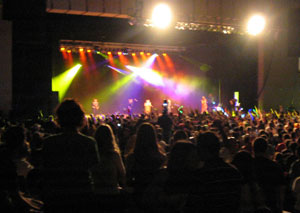Page 1 Page 2

I used to believe that the patrons of Eel Pie Island and other musical venues in South London were egalitarian. In retrospect, this was not true. Most of these people were white and probably never went on to higher education. It was a fine balance trying to pass O and A levels and being part of this music scene. It’s all but forgotten that in the early sixties it was difficult to gain admission to a university. Most of my school friends who’d gone on to university were not part of the Eel Pie Island scene. Like many studious people, they were shy and uncomfortable in social gatherings.
We’d been conditioned that we had received a good education. British history was the only history and, according to all the books, concluded in 1914. The books did not include much about the Irish famine or the Black and Tans. Best not to cover India in the syllabus either. In 1964, I had my first calculus lesson, and the world changed for me.
Looking back at those Eel Pie Island days in the early Sixties, I now see the abject ignorance we had of culture ― including our own. We really lived on two islands: England and Eel Pie. We were unaware of Picasso, Debussy, Satie or anything from Europe except Radio Luxembourg. Would they have printed Vincent Van Gogh on a biscuit tin in 1963? Which Christmas saw the first Haworth biscuit tin? What did we know of Virginia Wolfe, John Osborne or Edward Elgar? Scientific and engineering advancements eluded us even though many of us purported to be engineers or scientists. We could use logarithm tables but not all the functions on our slide rules.
While twelve-bar blues played, so did world events during the interval between 1963 and 1964; in 1964, Alec Douglas-Home was the prime minister, John F. Kennedy was assassinated in November 1963, and earlier that year he had said, “Ich bin ein Berliner.” Paul VI succeeded Pope John XXIII and the British spy Kim Philby was in Moscow. In 1964, violence erupted on Cyprus between the Greeks and the Turks, and Turkey’s inability to accommodate the Greek Cypriots dating from this period appears to have derailed their membership in the European Community, even with a pope’s nod.
Sport was not dead in England while the Graham Bond Organisation played on: West Ham won the F.A. cup, beating Preston North End. George Best was playing at Manchester United with Dennis Law and Bobby Charlton. England lost the Ashes to Australia. The Springboks beat the Welsh Rugby. Roy Emerson, the Australian, won Wimbledon singles in 1964.
Lester B. Pearson was the prime minister of Canada when much of the above unfolded. My associates in Vancouver and elsewhere are intrigued that I once saw George Best play with Manchester United but flabbergasted that I never attended a Wimbledon tennis match. I did go to a Seven-a-Side tournament at Twickenham and cheered for the Harlequins.
The late Long John Baldry used to live in Vancouver, and I had a pleasant conversation with him a few years ago. I understand Andrew Loog Oldham lives somewhere in Vancouver. Chris Barber gave a great concert here some time ago, and we had a chat in the auditorium. I take lunch near a record shop that has a poster of Rod Stewart, MBE, advertising the Great American Songbook Volume IV. I last saw him singing with the Jeff Beck Group, and before that at a school dance with Jimmy Powell & The Five Dimensions. Eric Clapton, the guitarist of The Roosters, will be playing in Vancouver soon. A month or so ago Ronnie Wood had an art exhibition here. The Rolling Stones recently played Vancouver, although Brian Jones, of course, was not with them. Many of the luminaries of those days played at our school dances, including the Rolling Stones, but that fact is of scant interest to the people with whom I have lunch or play tennis, so I keep it to myself. On Christmas Day my wife gave me Elton John’s Christmas Party CD ( I also have Oscar Peterson and Oliver Jones on my desk). I checked, and yes, Reg Dwight had been the keyboards player in Bluesology, which then included Long John Baldry. Yes, I have nostalgic memories of those Eel Pie Island days, and I’m amazed at how personalities of that far-off time have traveled with me through the years.
“I went fly fishing the other month here in Canada. I had a bite, but didn’t catch anything.”
Page 1 Page 2
Pages: 1 2

